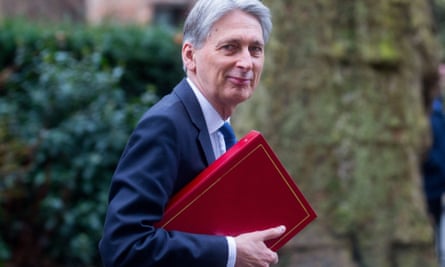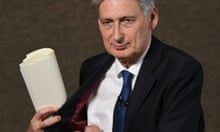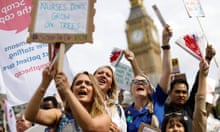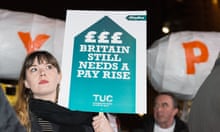When the chancellor Philip Hammond sits down on Tuesday after delivering his first spring statement – the streamlined replacement for what we used to call the budget – one man will be greatly in demand, popping up on every media outlet to tell us what the figures on borrowing levels and the projected deficit really mean. That man is Paul Johnson, director of the Institute for Fiscal Studies (IFS). I suggest to him that his official role is to pour a bucket of cold water over Hammond’s head, and he doesn’t disagree. “Economics is the dismal science, after all,” he says.
Happily, 51-year-old Johnson is not at all dismal. He is clever, sparky and down to earth – probably because he sees life through the lens of a father with four demanding sons going through the education system. He crunches all the numbers, but he also understands the personal stories behind those numbers. He has written about how his dyslexic second son has battled through further education and been disappointed by the threadbare nature of Britain’s vocational training system. That, in turn, informs his critique of a society unduly preoccupied with universities and graduates. Johnson, despite a mildly nerdy manner, is the opposite of the ivory-towered academic.
The idea of the spring statement, with the budget now pushed back to autumn, is to tell us where we are financially, and to kickstart consultations about the long-term fiscal challenges facing the UK. That, for Johnson, is the important bit. If the spring statement works, it is an opportunity to counteract the short-termism that bedevils British politics and to start thinking about the issues that really matter – the ageing population, the buckling health service, the lack of any coherent plan for social care, the fact that soon taxes are going to have to rise or public services will fall to pieces. There comes a point when you can no longer kick the can down the road because the road is no longer usable.
The Office for Budget Responsibility numbers cited in the spring statement will be better than those projected last autumn because tax receipts have been higher than anticipated, and Johnson reckons Hammond will indulge in some self-congratulation for having met the government’s austerity targets (albeit two years later than his predecessor George Osborne forecast) and eliminated the deficit on day-to-day spending. But Johnson is ready with his bucket of cold water. “Chancellors always talk up the positive numbers,” he says, “but we’re not out of austerity; we’re nowhere near out of austerity. There are still big spending cuts and big social security cuts to come.”

He says the government has done well to get the deficit under control, but thinks the pips are now starting to squeak. “If you look at the period up to 2013/14, spending came down without big political consequences or things falling apart. But, in a whole range of areas, that is no longer true. If you look at what’s happening in prisons it’s just disastrous. Local government until 2014 was coping fine. It really isn’t any more. Clearly, the health service is struggling in a way that, three or four years ago, it wasn’t. So it feels as if we’ve got to the crunch point. We’re really beginning to feel the cost.”
Government borrowing is now back to pre-financial crash levels. “It is quite an achievement to have got borrowing down from the highest level since the war to pretty much normal kinds of levels,” he says. “It’s come down from about 10% of national income to 2%, so from well over £150bn to a number somewhere in the low 40s.” That’s annual. It’s an achievement that we are only running up extra debt of £40bn a year. My head is starting to spin.
It spins further when he tells me what the national debt is – approaching £2tn, which equates to around 90% of GDP. When, I ask, do you hit the panic button about the size of the debt? “Who knows?” he says. “We are not close to that at the moment. Interest rates are still incredibly low, and despite the fact that the debt is twice as big as it was in 2008, we are not paying any more interest because rates are so low. The risk that the Treasury is balancing all the time is that at some point we’ll have another recession and if the debt then goes up by another 40% of national income, can we manage 130% of national income debt? Maybe. Probably. But at the point at which you can’t and people stop lending to you, then you lose control in quite a big way. You’re managing a very small risk of a very bad outcome.”
Johnson reckons it is time for politicians to level with the public about the financial challenges facing the UK. Brexit, plus our ageing population and the resultant pressure on health, pensions and social care, means something has to give. “It’s very hard to see what’s left to squeeze,” he says. “There is no defence budget to squeeze. There is no industry budget to squeeze, no housing budget to squeeze. Where do you go next? Unless you say, ‘Well, we are going to have to increase spending as a fraction of national income and increase taxes over the next 10 or 20 years’, which at least until the last Labour manifesto was a conversation that no politician was terribly keen to have.”
He says both of the main political parties are living in a fantasy world. “On the one side you have a party saying you can have all the welfare state we’ve ever had and pay no more tax, which isn’t true. And on the other side, you’ve got them saying we can levy more tax and it’ll be somebody else who pays because it’ll come off companies and the rich, which also isn’t true. Labour’s election manifesto had an awful lot of overestimates about what you can get from companies and the very rich, and didn’t fully balance out. You can’t have European standards of welfare with American-style tax levels. You have to make a choice.”
Making choices and being honest with the public is not, as Brexit shows, something politicians are good at. Analysing the shibboleths surrounding the NHS and the lack of progress on developing a system of social care, Johnson has written about the “infantilisation of public debate”, which he says emerged starkly in both the recent referendums. “In the Brexit referendum there were strong arguments on both sides, but you didn’t have any sense of the trade-offs. Referendums are a one-shot game and a pure yes/no, so everyone has to make out that everything is good about what they’re suggesting – the economy is better and immigration is better and sovereignty is better and and, and ... It was exactly the same in the Scottish referendum. There were some entirely sensible and plausible arguments for Scottish independence, but it was absurd to pretend it wouldn’t involve spending cuts or tax rises in Scotland.”
I ask him if he ever considered a political career himself – many of the young alumni of the IFS, which he once was, go into politics. He pauses before giving the definitive reason why he could never have done it: “If you are working in the party political system, you have to subjugate yourself to such an extent to the party line. Some politicians manage to be independent, but not many successful ones.”
That is not, however, to say that he despises politicians for the compromises they have to make and the false claims that are part and parcel of political life. He recognises the nightmarish task they have. “Making policy is hard. You’re trading off these huge political and ethical issues. You’ve got your own ideology; you’ve got lots of conflicting evidence; whatever you do is going to make some people better off, some people worse off, and you don’t quite know who they’re going to be.”

Does he ever doubt the merits of democracy, with its requirement to make a “retail offer” to the public that is inevitably overblown, perhaps even mendacious, to win votes? Might China be on to something with its authoritarian centralism that at least ensures stability and long-term planning? “I don’t doubt that democracy is the right way to do things,” he says, “but I do doubt some of our institutions. We are in an unusual position at the moment where you’ve got politics pulling to the left and to the right, and you’ve got nothing really filling the middle. That’s partly happening across the world, but it is a reflection of the way first-past-the-post works here.”
So does he speak for the technocratic middle? “I don’t know about the middle,” he says. “I’m always aware that there is a technocratic bit, which is what I and my colleagues do, but there is also an ideological bit and a democratic bit, and that’s really important. The best we can do – and the best that civil servants can do – is to put the evidence before the people who have been elected and then it’s their choice. That creates desirable constraints. It would be a disaster if the country was run by pure technocrats.” But why? That sounds ideal. “They wouldn’t be listening to the people,” he counters. “Arguably, that’s the lesson of Brussels.”
Johnson loves the IFS, and under him it has a pleasing energy and informality – a 50-strong group of mainly young researchers and economic and social policy experts who can run a slide rule over the more outlandish claims of politicians and point out the pitfalls of their policies. He spent his 20s there after getting a first in philosophy, politics and economics at Oxford, then worked at the Cabinet Office, the Financial Services Authority and the Treasury before returning to the IFS as a research fellow in 2007, just in time for the nation-redefining financial crash. He became its director in 2011.
His two immediate predecessors, Andrew Dilnot and Robert Chote, did 11 and eight years respectively before going on to grand posts elsewhere (and in Dilnot’s case bagging a knighthood), but Johnson looks nonplussed when I ask him if 10 years will be enough for him. He clearly hasn’t thought about stepping down, or started eyeing up other plum jobs. “I love the IFS,” he once declared. “I love what it does and I love the way it does it.” That love affair shows no sign of abating.
One economist told me that if you read Johnson’s weekly articles in the Times carefully, you are filled with despair, because as a nation we refuse to confront the hard questions he is raising. Politicians like to gambol in the long grass. I ask Johnson, who in person is anything but downbeat, whether despair is a legitimate response to his truth-telling. “I’m not filled with despair about what’s possible because we are a relatively low-taxed country by European standards,” he says. “You could perfectly easily, in an economic sense, raise more tax and still have an equitable, well-functioning economy. The thing that worries me is the difficulty of having a sensible conversation about it and the belief that, if you are going to raise more money from tax, there’s some free money floating around.”
There is no free money. If we want better health care, social care, education, transport, we are all going to have to stump up. He estimates that in the next 20 years, we will have to pay an extra 3% of national income in tax – equivalent to about £60bn a year – just to meet the rising pension and social care bill. He floats some bracing ideas: VAT on food; paying social insurance to help fund the NHS; road pricing to replace the £30bn a year in fuel duty that will be lost as cars move away from petrol and diesel; wealth taxes levied on expensive properties, second homes (which he sees as a key factor in the housing crisis) and even personal pensions, which have been sacred until now. These are the sorts of big ideas he wants Philip Hammond to start to embrace next week. Whether the chancellor will rise to the challenge is another matter. That long grass looks very inviting.
Even without Brexit the challenges facing the UK would be formidable. With Brexit they look cataclysmic. “The economics are obvious,” he says. “If you make trade with your biggest, nearest and richest trading partner more expensive, you will make yourself worse off. The truth is there is no dispute about that. Of course there’s a case for Brexit. It’s just not an economic case. It’s a controlling immigration case. With everything, and this is what’s frustrating about a lot of political debate, there are trade-offs. Do you want control of your borders or do you want to avoid taking a hit of a couple of per cent of GDP? You can’t have both. Politicians tell you that you can have your cake and eat it, but you can’t. And that’s not a jibe at Boris. It’s true of pretty well all politicians about everything.”









Comments (…)
Sign in or create your Guardian account to join the discussion